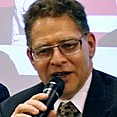American Protestant Theology: Presentation of Msgr. Giussani's Book
 Friday, February 21, 2014 at 8:30PM
Friday, February 21, 2014 at 8:30PM A presentation of American Protestant Theology: A Historical Sketch, the latest book published by the founder of Communion and Liberation with Dr. Archibald J. SPENCER and Dr. Dominic A. AQUILA
Presented by Crossroads Cultural Center in collaboration with Communion and Liberation and the University of St. Thomas Office of Academic Affairs
Many people know Giussani as a theologian and educator, as the author of many books that explore the fundamental and constitutive factors of the Christian faith. Last but not least, he was also the founder of the ecclesial movement of Communion and Liberation, which has been a decisive inspiration for Crossroads.
In American Protestant Theology, Luigi Giussani traces the history of the most meaningful theological expressions and the cultural significance of American Protestantism, from its origins in seventeenth-century Puritanism to the 1950s. Giussani clarifies and assesses elements of Protestantism such as the democratic approach to Church-State relations, "The Great Awakening," Calvinism and Trinitarianism, and liberalism. His rich references and analytical descriptions reconstruct an overview of the development of a religion that has great importance in the context of spiritual life and American culture. He also displays full respect for the religious depth from which Protestantism was born and where it can reach, and expresses great admiration for its most prominent thinkers and spiritual leaders, including Jonathan Edwards, Horace Bushnell, Walter Rauschenbusch, Reinhold Niebuhr, and Paul Tillich. Further testament to Giussani's clear-minded and comprehensive knowledge of Christianity, American Protestant Theology makes the work of a master theologian available in English for the first time.
American Protestant Theology is somewhat unusual compared with Giussani's other works. First of all, it is a scholarly work in the strict sense of the word; in fact, it was first written as an academic dissertation. As such, it is first of all an erudite survey of a vast body of theological materials that cover several centuries of history. Secondly, its subject is North-American Protestant theology, which is a rather unexpected topic for an Italian, Roman Catholic priest like Giussani. As it turns out, since a relatively young age Giussani was very aware of theological developments on the other side of the Atlantic, and he did find valuable elements in American Protestant theology which played a part in the formation of his own thought.
Two natural questions arise. On one hand, we would like to understand Giussani's assessment of North-American Protestant theology, what he regards as its most important contributions, and how he interprets its development. On the other hand, one wonders what ideas he finds most valuable, and what the role of such ideas had in his own intellectual and spiritual development.
To answer these questions, we have invited two scholars who are very knowledgeable both about the American Protestant tradition and about Giussani's thought. Our first guest speaker, Dr. Archie Spencer, wrote the introduction to American Protestant Theology: A Historical Sketchbook. Our second guest, Dr. Dominic A. Aquila, will speak about the influence of American Protestant Theology on the formation of Fr. Giussani's thought and experience.
The event is FREE and OPEN TO THE PUBLIC.
About this Event
Date: Friday, February 21, 2014Time: 6:30pm
Location: University of St. Thomas - Anderson Hall Room 103
4001 Mt. Vernon St. Houston, TX 77006
About the Speakers
 Archie Spencer, PhD
Archie Spencer, PhD Associate Professor of Theology, Northwest
 Dr. Dominic A. Aquila
Dr. Dominic A. Aquila Vice President of Academic Affairs, University of St. Thomas
Invitation
Download the inviteTranscript
Read the transcript herePhotos
Click here to view the photosVideo
American Protestant Theology: Presentation of Msgr. Giussani's Book- Part 1 Houston American Protestant Theology: Presentation of Msgr. Giussani's Book- Part 2 Houston spencer
spencer 

Reader Comments